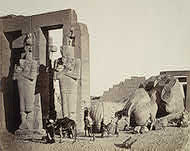
|
Francis Frith (artist) British, 1822 - 1898 The Ramasseum of El-Kurneh, Thebes, First View, c. 1857 albumen print from collodion negative sheet (trimmed to image): 38.1 x 47.9 cm (15 x 18 7/8 in.) mount: 54 x 74 cm (21 1/4 x 29 1/8 in.) Millennium Funds 2003.35.1 |
Object 5 of 15
A founding member of the Liverpool Photographic Society, Francis Frith began to make photographs in the early 1850s. Between 1856 and 1860 he made three trips to the Middle East, traveling extensively by boat, horseback, and caravan throughout Egypt, Palestine, and Syria. Carrying an impressive amount of equipment, Frith used three cameras: one for stereoscopic views, one for 8" x 10" negatives, and one with a mammoth plate for 16" x 20" negatives. Because he used the wet collodion process, he also had to transport fragile glass negatives, chemicals, and a darkroom to coat and develop his plates on site. In addition to struggling with the harsh, hot, and dusty environment, he and his companions had to contend with shipwrecks as well as attacks by bandits and kidnappers. Yet his remarkably masterful photographs belie these difficulties and instead celebrate the architectural wonders of the Middle East.
The Ramasseum of El-Kurneh, Thebes, First View was made on his second trip to the region. The site of the fallen colossus of Ramses II was a popular stop for Western tourists as they traveled up the Nile. While the figures posing around the monument make clear its enormous size, the man jauntily perched atop Ramses' remains succinctly represents Frith's enthusiastic support of the expansion of the British Empire: "It is an exciting thought that perhaps to England will eventually fall the task of governing this wonderful land and of Christianising its mummied and paralysed life."
| « | back to gallery | » | continue tour |


